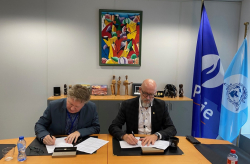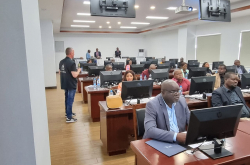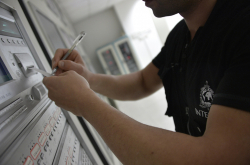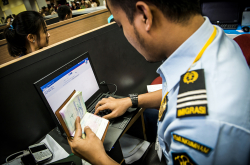The goal of the I-EAC Project is to strengthen policing capabilities in the member countries of the East African Community (EAC) – Burundi, Kenya, Rwanda, South Sudan, Tanzania and Uganda – in order to combat terrorism and transnational organized crime.
This will be achieved through increased connectivity to INTERPOL’s secure, global police communications network (I-24/7) and interoperability between EAC national systems and INTERPOL databases.
The I-EAC Project will also complement other INTERPOL projects in the region to ensure maximal use of resources and avoid duplication.
The Context
The EAC region faces ongoing challenges from terrorism and crossborder crimes such as trafficking in human beings. The major terrorist threat in East Africa comes from the Salafi-jihadist organization Al-Shabaab and affiliated groups across the region.
While the EAC Common Market serves to accelerate economic growth through the free movement of persons, goods and capital, it makes regional cooperation among the EAC partner countries more important than ever, in order to effectively control borders and thereby prevent and detect irregular movements, criminal activities and terrorism.
Safeguarding peace and security in East Africa is key for the EAC’s ultimate goal of political federation, and only a regional approach to peace and security will guarantee stability and development.
Project Objectives
The three specific objectives of the project are as follows:
Increase regional collaboration and inter-agency cooperation among selected national authorities within the region.
Enhance border control/security by boosting the capacity of frontline officers, counter-terrorism and specialized units at selected border crossing points, seaports and airports through the integration of INTERPOL’s technical solutions (FIND/MIND and WISDM) into their national systems.
Increase information sharing in real-time among services at the national, regional and international levels and increase the collection of biometric data related to the crossborder movement of foreign terrorists fighters and returnees. Key to this is the extension of access to I-24/7 for populating and querying INTERPOL databases.
Expected Outcomes
The project will benefit all citizens of the EAC member states especially women, children and vulnerable communities. The specific outcomes will be:
- Modernization of INTERPOL National Central Bureaus to strengthen the I-24/7 network;
- Extension of I-24/7 to airports, seaports, land borders and selected specialized units;
- Capacity building and training to increase the knowledge and readiness of the end users;
- Regional workshops and screening operations to test the new capabilities.
Timeline
The project started in December 2019 and will end in September 2023. The main phases of the project are as follows:
- 2019: Initialization;
- 2020: Planning;
- 2021: Execution Group 1 (three of the six beneficiary countries);
- 2022: Execution Group 2 (the remaining three beneficiary countries);
- 2023: Closure.
Funding
The project is funded by the European Development Fund (EDF) through EU Delegation to Tanzania.
Related news

Breakthrough in longstanding Dutch missing person case
11 October 2024
INTERPOL welcomes new DNA legislation in Belgium
11 April 2024
Border security threats focus of STOP operations in Africa
8 December 2023








